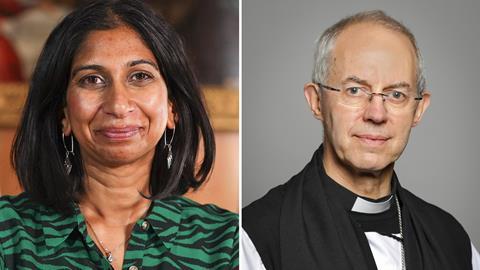Good law should protect most of the people, for most of the time, says George Pitcher. He won’t condemn the Archbishop of Canterbury or the Home Secretary for speeding, but he does expect them to face the consequences honourably

I was on a speed awareness course some years ago. Early on, the leader asked us a technical question, probably about breaking distances or something. I raised my hand and gave the correct answer. He seemed impressed and asked where I’d learned that. “On my last speed awareness course,” I truthfully replied.
Yes, I was a serial speed offender. But, thankfully, it never got critical and I drive better – and more slowly - now. But it’s easily done and so I sympathise with both Most Rev Justin Welby, Archbishop of Canterbury and our Home Secretary, Suella Braverman MP, who have both recently been nicked for speeding.
Special treatment
Welby paid his fine (eventually – there were allegedly ’admin errors’). Braverman is in rather more trouble. Not with the police, but with political enemies who claim she leant on civil servants to get her access to a private online speed awareness course, away from prying eyes or gloating members of the public.
If this is so, she has caused herself far more damage than the harm she sought to avoid. I presume she thought it wouldn’t look good to be pictured, as she surely would have been, sitting with the naughty boys and girls in a pub conference room somewhere, pencilling answers to questions such as: “What damage is caused by speeding?”
The word for Jewish law, Halakha, can be translated as “a way of walking”
As it is, her high-handed demand for special treatment is of a piece with those who have recently seemed to think that laws are for the little people. It’s not so much that government ministers believe they’re above the law - from Covid-19 to almost everything that Boris Johnson said and did as prime minister - but that they enjoy a privileged position with regard to it. It’s ‘do as I say, not what I do’ on steroids.
But does it really matter? To err is human and to forgive is divine, so they say. Against that, people in authority have a duty to set an example. Although I’m not sure who would regard either Welby or Braverman as a role model.
As Christians, we have a choice. We can be po-faced about our laws. I have heard Christians claim that because Jesus Christ said he’d “come not to destroy the law, but to fulfil it” (see Matthew 5:17), he would be in favour of everything from 20mph speed limits and banging up hippies for smoking weed to the summary arrest of all anti-monarchist demonstrators.
A design for life
But Jesus didn’t mean law in that sense, he meant the ancient Hebrew law of the kings and prophets. These were the books of the Jewish Torah, containing rules for living, but which were really about what it meant to be a people of God. It defined their culture. The word for Jewish law, Halakha, can be translated as “a way of walking”.
It’s in this context that we’re called both to frame and interpret our laws, in a state in which the Church of England is established in law. It’s about our laws defining who we are as a people. That doesn’t mean Welby is necessarily a hypocrite for picking up a speeding fine, so long as he adheres to that principle in his practice.
Let me give an example. Campaigners for a change in the law to allow assisted dying in the UK often justify their desires by claiming: “It’s my life and I should be allowed to do with it as I wish.”
People in authority have a duty to set an example
Now compare that claim with the law on speeding that Braverman and Welby (and I) have breached. It’s beyond risible to imagine that a reasonable defence to doing 40mph in a 30mph zone might be: “It’s my car and I should be allowed to do what I want with it.”
Defend and protect
The law is there to protect the majority of people, most of the time. Or good law is, anyway. That’s why we have speed limits, to protect pedestrians and other motorists. And it’s why many of us believe that the law against assisted dying is there to protect most people - and especially the disabled, the vulnerable, the depressed and the terminally ill.
These are laws that define our values and who we are as a people. In the Christian faith, it’s why our law is fulfilled rather than destroyed by our sense of what is morally right.
And it’s why an archbishop should both pay his speeding fine and condemn the proposed Illegal Immigration Bill in the House of Lords as immoral - because we can’t recognise the gospel in it. We’re all in favour of him putting his foot down – just not in order to get there on time.





































No comments yet